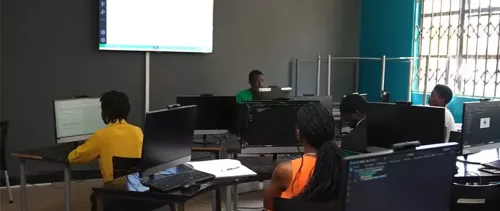
Connectivity is a public good: Let’s act accordingly, now and tomorrow
One and a half billion. That’s the number of children who need online schooling due to the coronavirus pandemic (COVID-19). While some parents worry about the quality of education their children will receive in a virtual setting, online education is still not even a remote possibility for millions of unconnected kids across the world. Amid social distancing, connectivity is what keeps us informed and employed; it maintains our mental and even physical well-being. For those without internet access, the economic and social impact of the pandemic will be even more colossal.
In the battle against COVID-19, digital technologies are front and center. Countries that do not have the infrastructure for widespread broadband are bracing for the worst. Think about Sub-Saharan Africa, where 60 percent of the population remains out of reach of 4G networks, or countries like Indonesia, where 2G is still the norm. As the crisis wears on, and pandemics of this kind become more common, some countries will be left behind. For a start, being able to deploy digital health care solutions for detecting COVID-19 can save lives, and this will also be important to protect countries against future pandemics.
In the battle against COVID-19, digital technologies are front and center.
From health care to education to businesses of all sizes, there’s no real alternative: governments, donors and the telecom industry must do all they can to connect the unconnected. As this unprecedented crisis has shown, connectivity is a public good.
But achieving universal and affordable broadband access is not a utopian goal. And the surge of initiatives underway to boost connectivity across the globe brings me hope. In the countries most affected by COVID-19, regulations are being adjusted to boost internet capacities. And the private sector is doing its part. We see this in Kenya, where high-altitude internet balloons beaming 4G signals will bring connectivity to rural areas, after the government fast-tracked regulatory approval. All over the world, telecom companies are increasing internet speed and capacity at no cost to the consumer. In Peru, the telecom regulator plans to issue a decree prohibiting the suspension of services for non-payment. In Iraq, the Ministry of Telecommunications has banned all roaming charges on cellular calls, and in Oman the regulator has expanded spectrum assignments.
But this show of solidarity in the context of a catastrophic event, while commendable, falls short of what we need most: digital resilience. We are being reactive when we should have been proactive. We know that bridging the digital divide will take colossal amounts of money, as well as require the mobilization of a strong coalition of partners who are committed for the long haul. A recent report from the Broadband Commission estimates that around $100 billion will be needed to achieve universal access to broadband connectivity in Africa. The World Bank Group has launched the Digital Economy for Africa Initiative with the bold objective of digitally connecting every individual, business, and government in Africa by 2030. But the pandemic has demonstrated all too vividly that we cannot afford to wait.
Now is the time to work together to achieve the promise of new technologies for all and keep the world connected — even in these times of social distancing.
What will it take to achieve universal, affordable, and good-quality broadband?
First, and in the short term, increasing bandwidth, managing congestion to keep the internet from breaking, and connecting the unconnected. There are matters of urgency. They call for changes in network configuration, traffic management, and access to spare capacity in infrastructure in order to provide connectivity to institutions, households, and smaller businesses. Public utilities have valuable assets, such as ducts and poles, buildings, land rights, and even fiber networks that could be leveraged for cost-effective deployment of broadband infrastructure. For telecom operators, infrastructure sharing is the way to go to expand coverage and reduce costs in network deployment.
Second, we must power digital transformation in some of the world’s poorest countries by massively scaling up resources dedicated to building the foundations of a thriving digital economy. This crisis painfully shows that the benefits and opportunities of technology are not equally distributed. In the informal economy, there is no such thing as telecommuting. In poor countries, even established businesses, more often than not, do not have the capability to move to online operations. Teachers, students, and government officials need connectivity, but also digital skills to use these tools effectively. Economies are increasingly relying on fintech to stay afloat, and demand for services such as mobile payments, food delivery, and e-commerce will grow exponentially.
Source : World Bank Blogs
Originally published in Le Monde Afrique


